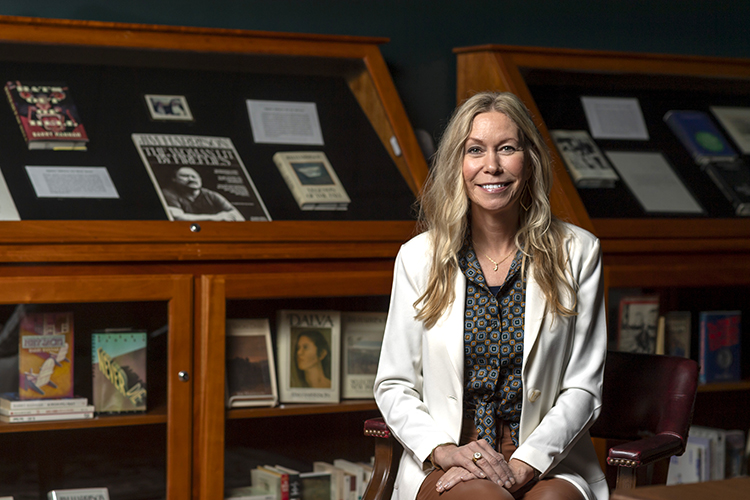
University archivist Jeannie Speck-Thompson is working to gather and process archival materials on the history and operations of the University of Mississippi. Photo by Srijita Chattopadhyay/Ole Miss Digital Imaging Services
Speck-Thompson to document university’s history, serve as liaison to departments
Jeannie Speck-Thompson, a native of Ecru, has been named university archivist, the first faculty member devoted to this position in two decades at the University of Mississippi.
An assistant professor, Speck-Thompson will process multiple formats of archival materials that document the history and operations of the university, including correspondence, departmental newsletters, memoranda, photographs, audiovisual recordings, and event fliers and programs.
“Having a dedicated person process these large collections and make them accessible is only part of the job,” said Greg Johnson, UM head of special collections, blues curator and professor. “Jeannie will also serve as a liaison to departments around the university to ensure we are properly saving all of the exciting campus projects of today for the scholars of tomorrow.”
Previously a library media specialist for Pontotoc County Schools, Speck-Thompson received a bachelor’s degree in English from UM in 1991 and a master’s in library and information science from the University of Southern Mississippi in 2005.
She also received an archives and special collections graduate certification in 2020 and is pursuing a doctorate in history at Ole Miss. She has more than 23 years of experience working in libraries and secondary education.
Her work includes supervising the effort to preserve the home and papers of M.B. Mayfield, the Ecru artist who unofficially integrated the university in 1949. As part of that work, she led an archival internship for four Ole Miss history graduate students in 2021.
In her new role within Archives and Special Collections, Speck-Thompson said she will seek out materials from minor as well as major players who have contributed to the university’s history.
“I hope to fill in gaps that serve scholarship and research in the collections,” she said. “I will work to pull together all of the existing materials that are university archives and use outreach to draw researchers and students to study them.
“The number of materials to be arranged is significant because there has not been one individual dedicated to working just with the collections that detail the history and operations of the University of Mississippi. This work is needed. It is a chance to do some good and a worthwhile endeavor that I am honored and excited to do.”
By Benita Whitehorn




